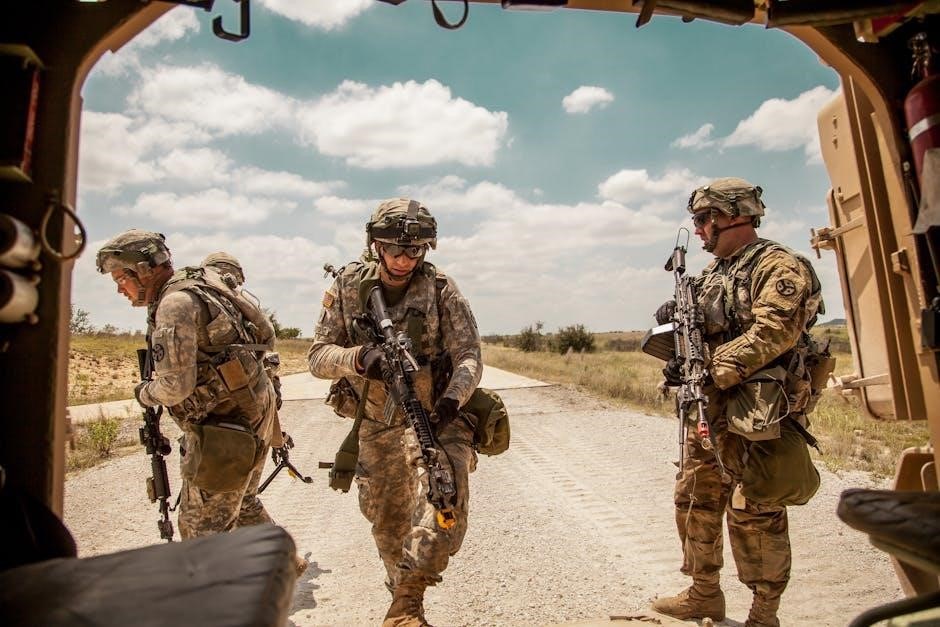The Soldier’s Creed is a foundational statement defining a U.S. Army Soldier’s identity, responsibilities, and values. It serves as a moral guide, emphasizing loyalty, duty, and honor.
1.1 Overview of the Soldier’s Creed
The Soldier’s Creed is a concise statement that embodies the identity, purpose, and ethical foundation of U.S. Army Soldiers. It underscores the commitment to serve the nation, uphold Army Values, and act with integrity. The Creed emphasizes the Soldier’s role as a warrior and team member, dedicated to protecting the country and its people. It also highlights the importance of personal responsibility, resilience, and adherence to a moral code. As a guiding document, the Soldier’s Creed inspires Soldiers to strive for excellence and remain faithful to their mission and fellow service members. It is often memorized and referenced in daily military life.
1.2 Importance of the Soldier’s Creed in Military Culture
The Soldier’s Creed holds profound significance in military culture, serving as a unifying force that fosters identity, accountability, and shared purpose. It instills a sense of belonging and pride among Soldiers, reinforcing the Army’s core values of loyalty, duty, and respect. By aligning individual actions with collective goals, the Creed ensures cohesion and moral direction. It acts as a guide for ethical decision-making, particularly in challenging situations. The Creed also promotes resilience and selflessness, encouraging Soldiers to prioritize mission success and teamwork. Its influence extends beyond training, shaping the mindset and behavior of service members both on and off duty, thereby strengthening military culture and tradition.

Key Concepts and Values in the Soldier’s Creed
The Soldier’s Creed emphasizes personal courage, loyalty, duty, respect, selfless service, honor, and integrity. These values guide Soldiers’ behavior and decision-making, fostering a strong moral foundation.
2.1 The Core Values of the U.S. Army
The U.S. Army’s core values are the foundation of the Soldier’s Creed, guiding Soldiers’ actions and decisions. These values include loyalty, duty, respect, selfless service, honor, integrity, and personal courage. Loyalty binds Soldiers to their unit and country, while duty ensures commitment to mission and team. Respect fosters dignity and unity, and selfless service prioritizes others’ needs over personal gain. Honor and integrity uphold moral principles, and personal courage empowers Soldiers to act rightly in adversity. Together, these values form the moral framework that defines a Soldier’s identity and behavior, both on and off duty, reflecting the Army’s enduring legacy of service and excellence;
2.2 The Role of Loyalty, Duty, and Respect
Loyalty, duty, and respect are central pillars of the Soldier’s Creed, shaping the moral and ethical foundation of U.S. Army personnel. Loyalty emphasizes unwavering commitment to the unit, fellow Soldiers, and the nation. Duty underscores the responsibility to fulfill obligations with discipline and integrity, regardless of personal cost. Respect fosters mutual trust and dignity among Soldiers, fostering unity and cohesion. These principles guide Soldiers’ actions, ensuring adherence to the Army’s values and mission. By embodying loyalty, duty, and respect, Soldiers uphold the Creed’s ideals, strengthening their resolve and contributing to the Army’s legacy of service and honor.
2.3 Selfless Service and Honor in the Creed
Selfless service and honor are cornerstone values in the Soldier’s Creed, defining the moral compass of U.S. Army personnel. Selfless service prioritizes the greater good over personal interests, encouraging Soldiers to put the needs of the mission and their comrades first. Honor represents integrity, ethical behavior, and adherence to the Army’s values, ensuring actions align with the highest standards of conduct. Together, these principles inspire Soldiers to act with courage and integrity, fostering trust and discipline within the ranks. By embodying selfless service and honor, Soldiers uphold the Creed’s ideals, contributing to the Army’s mission and legacy of excellence. These values are integral to the Soldier’s identity and professional ethos.
The Soldier’s Creed and Its Practical Applications

The Soldier’s Creed provides guiding principles for daily military life, influencing decision-making, behavior, and teamwork. It ensures alignment with Army values, fostering discipline and mission focus.
3.1 How the Creed Influences Daily Military Life
The Soldier’s Creed deeply impacts daily military life by instilling a sense of accountability, teamwork, and ethical behavior. It reminds Soldiers of their commitment to the nation, fostering a culture of respect and duty. The Creed’s emphasis on living Army values ensures that Soldiers conduct themselves with integrity, both on and off duty. This guiding framework influences decision-making, promotes unity, and reinforces the importance of selfless service. By internalizing the Creed, Soldiers are better equipped to navigate challenges, uphold professional standards, and maintain discipline. It serves as a constant reminder of their purpose and responsibilities, shaping their actions and attitudes in all aspects of military life.
3.2 Training and Indoctrination of the Soldier’s Creed
The Soldier’s Creed is integrated into military training to instill its principles from the outset. During Basic Combat Training, recruits memorize and recite the Creed, fostering a shared identity and understanding of Army values. Training materials, such as the Soldier’s Creed PDF, emphasize its significance, ensuring new Soldiers grasp their responsibilities and ethical obligations. The Creed is reinforced through classroom instruction, practical exercises, and leader interactions, helping Soldiers internalize its message; This indoctrination process ensures that the Creed becomes a guiding force in their professional development, shaping their mindset and behavior as they transition into active duty.
3.3 Leadership and the Soldier’s Creed
Leadership is a cornerstone of the Soldier’s Creed, as it emphasizes the responsibility to lead by example and inspire others. Leaders are expected to embody the Creed’s values, fostering a culture of trust, accountability, and teamwork. The Creed serves as a moral compass for leaders, guiding their decision-making and actions. By living the Creed, leaders create an environment where Soldiers feel empowered to uphold the Army’s standards. Effective leadership ensures the Creed’s principles are not just recited but practiced daily, strengthening unit cohesion and mission readiness. Leaders who internalize the Creed cultivate a legacy of excellence and integrity within their teams.
Historical Development of the Soldier’s Creed
The Soldier’s Creed was formally established in the 21st century as a response to modern military challenges, reflecting the U.S. Army’s enduring core values and warrior ethos.
4.1 Origins and Evolution Over Time
The Soldier’s Creed originated in 2003 as part of the U.S. Army’s initiative to reaffirm its core values. It was introduced by General Eric Shinseki, then-Chief of Staff, to foster unity and identity among Soldiers. The Creed evolved from earlier concepts of military professionalism and ethical conduct, reflecting the Army’s commitment to adapt to modern challenges. Over time, it has been refined to emphasize leadership, resilience, and the warrior ethos. Its enduring relevance lies in its ability to inspire Soldiers, ensuring alignment with the Army’s mission and values. The Creed remains a cornerstone of military culture, shaping the identity and professionalism of U.S. Army personnel.
4.2 Key Figures in Shaping the Creed
The Soldier’s Creed was significantly influenced by General Eric Shinseki, who served as the Chief of Staff of the U.S. Army from 1999 to 2003. His vision to reinvigorate Army culture and professionalism laid the groundwork for the Creed’s creation. Other key figures included senior military leaders and theorists who contributed to its development, ensuring it reflected the Army’s evolving values. Sergeant Major of the Army Kenneth Preston also played a role in promoting the Creed’s adoption. Their collective efforts ensured the Creed became a unifying statement, resonating with Soldiers across generations and reinforcing the Army’s identity and purpose.

The Soldier’s Creed in Modern Military Context
The Soldier’s Creed remains vital in contemporary warfare, guiding Soldiers’ actions and fostering unit cohesion. Its principles of loyalty, duty, and respect continue to inspire modern military leadership and shared identity.
5.1 Relevance in Contemporary Warfare
The Soldier’s Creed remains highly relevant in modern military operations, providing a moral foundation for Soldiers facing complex, dynamic challenges. Its emphasis on loyalty, duty, and respect aligns with the demands of contemporary warfare, where teamwork and ethical decision-making are critical. The Creed’s principles guide Soldiers in adapting to evolving threats, from asymmetric warfare to technological advancements. It reinforces the importance of selfless service and honor, fostering resilience and unity among troops. By upholding these values, Soldiers maintain their professional identity and commitment to protecting the nation, ensuring the Creed’s enduring significance in today’s military landscape.
5;2 The Creed’s Role in Building Unit Cohesion
The Soldier’s Creed plays a pivotal role in fostering unit cohesion by instilling a shared sense of identity and purpose among Soldiers. It emphasizes collective responsibility, mutual trust, and a commitment to shared values, which strengthens bonds within units. By aligning individual actions with the Creed’s principles, Soldiers cultivate a sense of belonging and unity. This shared foundation enhances teamwork, communication, and resilience, enabling units to operate cohesively in high-stress environments. The Creed’s emphasis on loyalty and respect further reinforces the importance of camaraderie, making it a cornerstone for building and maintaining strong, effective military teams.

Challenges and Criticisms
The Soldier’s Creed faces challenges in balancing individuality with conformity, as some critics argue it may stifle personal expression while emphasizing unity and adherence to doctrine.
6.1 Balancing Individuality and Conformity
The Soldier’s Creed emphasizes unity and adherence to shared values, which can sometimes conflict with individuality. Critics argue that the Creed’s focus on conformity may suppress personal expression and creativity, potentially limiting diverse perspectives within the military. While the Creed fosters cohesion and collective identity, it challenges soldiers to maintain their unique identities while aligning with its principles. This tension requires a delicate balance, as excessive emphasis on conformity might hinder innovation and critical thinking, which are essential for modern military operations. The Creed’s success lies in nurturing unity without stifling the individual strengths that contribute to mission success.
6.2 Critiques of the Creed’s Application
Some critics argue that the Soldier’s Creed, while inspiring, may be applied rigidly, potentially leading to moral dilemmas. The emphasis on loyalty and duty can sometimes result in blind obedience, overshadowing critical thinking. Additionally, the Creed’s ideals may not always align with the complexities of real-world scenarios, where ethical decisions are not always clear-cut. Critics also suggest that the Creed’s focus on collective identity might inadvertently justify actions that could be morally questionable. This raises concerns about how the Creed is interpreted and applied in practice, highlighting the need for nuanced understanding and ethical reasoning in its implementation.
The Soldier’s Creed remains a cornerstone of U.S. Army identity, guiding Soldiers with enduring values like loyalty, duty, and honor, ensuring unity and resilience in service.
7.1 The Enduring Legacy of the Soldier’s Creed
The Soldier’s Creed is a timeless guide that has shaped the identity and culture of the U.S. Army. It provides a moral and motivational framework for Soldiers, emphasizing loyalty, duty, and respect. The Creed’s enduring legacy lies in its ability to inspire unity and resilience, fostering a shared sense of purpose among service members. By living the Army Values, Soldiers embody the Creed’s principles, ensuring its relevance across generations. Its influence extends beyond individual actions, shaping the Army’s collective ethos and commitment to defending the nation. The Creed remains a cornerstone of military professionalism, guiding Soldiers to uphold honor and integrity in all endeavors.
7.2 Future of the Soldier’s Creed in the U.S. Army
The Soldier’s Creed will continue to play a vital role in shaping the U.S. Army’s identity and culture. As the military evolves, the Creed’s core values of loyalty, duty, and respect remain timeless, ensuring its relevance in future challenges. It will serve as a foundation for adapting to modern warfare and technological advancements while fostering resilience and unity among Soldiers. The Creed’s emphasis on honor and selfless service will guide the Army in developing leaders who embody its principles. By integrating these values into training and leadership, the Soldier’s Creed will remain a cornerstone of military professionalism, inspiring future generations to uphold the Army’s legacy.